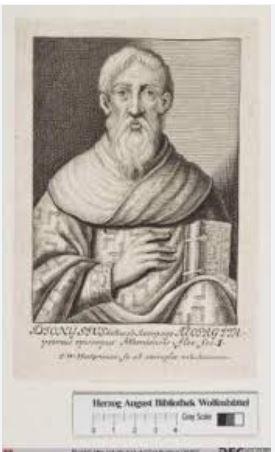On mystical theology

The mystical theology of Dionysius the Areopagite (also Dionysius the Areopagite, or Dionysius the Pseudo-Areopagite) is one of the most influential and profound currents in Christian mysticism and theology. Dionysius was an early Christian mystic whose works addressed mystical union with God, negative theology, and the hierarchy of heaven. His writings were particularly influential in the Middle Ages and shaped later Christian mysticism and the development of theological philosophy.
🌟 Who was Dionysius the Areopagite?
The name "Dionysius" is possibly a pseudonymous title, referring to Dionysius the Areopagite, an early Christian and alleged disciple of the Apostle Paul (see Acts 17:34). However, many researchers agree that the writings of Dionysius the Areopagite are not by the historical Dionysius, but by an unknown mystical theologian in the late 5th or early 6th century AD who claimed to be Dionysius. Therefore, he is often referred to as Dionysius the Pseud-Areopagite.
🕊️ The main works of Dionysius:
The most important writings of Dionysius the Areopagite are:
"Mystical Theology" (Theologia Mystica)
"The Celestial Hierarchy" (De Coelesti Hierarchia)
"The Ecclesiastic Hierarchy" (De Ecclesiastica Hierarchia)
"On the Names of God" (De Divinis Nominibus)
These works are a complex system of mystical theology, heavily based on the ideas of Plotinus and Neoplatonic philosophy. They represent a profound exploration of the connection between God and creation and offer mystical guidance for the union of the human soul with the divine.
🌀 The Mystical Theology of Dionysius:
Dionysius' mystical theology is based on the idea that true understanding of God can only be achieved through a "negative" or "apophatic" theology—a theology of negation.
1. Negative Theology:
Dionysius teaches that God is ineffable and incomprehensible. Anything we can say about God is ultimately inadequate, as our understanding of God is limited by the boundaries of human language and experience. Therefore, Dionysius describes mystical union with God not through affirmative statements, but through negation and emptiness. God is "beyond all concepts," "above all concepts," and "above all being." This teaching is deeply connected to the Neoplatonic tradition, which assumes that the Absolute, or the One, exists beyond the world of appearances and can only be experienced through mystical union.
2. The "Elevation" of the Soul:
For Dionysius, mystical union with God is a process of inner elevation of the human soul. This process involves several stages of purification and transformation:
Preparation: The soul must free itself from worldly attachments.
Purification: This is achieved through prayer, meditation, and the pursuit of virtue.
Light: In a mystical state, the soul attains enlightenment.
Union with the Divine: Eventually, the soul achieves an experience of union with God, which, however, cannot be fully expressed in words.
3. Hierarchy and the Angels:
Dionysius also develops a detailed doctrine of the celestial hierarchy, which includes a systematic ordering of the angels. He distinguishes between different angelic orders and presents the angels as mediators between the earthly world and the divine. This hierarchy is an integral part of his mystical vision, as it shows how humanity can gradually enter the divine order through spiritual practice and purification.
4. The "Light and Darkness" Metaphor:
In Dionysius's mystical theology, the "Light of God" is a central symbol. Light is presented as a sign of the divine presence and as a source of knowledge. Yet at the same time, Dionysius also speaks of the "darkness" in which God hides—the mystical state in which humanity experiences the absolute presence of God in a form beyond all earthly perception and comprehension.
🏛️ Influence on Christian Mysticism and Philosophy:
Dionysius' writings had a tremendous impact on Christian mysticism in the Middle Ages, influencing important thinkers and mystics such as:
Meister Eckhart
John of the Cross
Bernard of Clairvaux
Thomas Aquinas
Dionysius's works were widely studied, especially in medieval mysticism, and his ideas about mystical union with God, as well as his negative theology, influenced many mystical movements and contemplative traditions.
✨ The Significance of Dionysius's Mystical Theology:
The mystical theology of Dionysius the Areopagite remains of great importance because it explores intuition.
Dionysius emphasizes the importance of experience and experience as the key to understanding the divine. Instead of conceptualizing the divine in dogmatic terms, Dionysius urges believers to deny their experience of God, as the true divine lies beyond human comprehension.
For Dionysius, mystical union is the culmination of the spiritual journey, and it is achieved not through cognitive insight, but through pure experiencing and experiencing of the divine.
🌿 Summary:
The mystical theology of Dionysius the Areopagite is a fascinating approach that delves into the deepest aspects of the human connection to the divine. Dionysius's emphasis on negative theology and mystical experience has had far-reaching effects on Christian spirituality and mysticism and remains an important resource for those seeking the spiritual path beyond dogma and theoretical theology.

